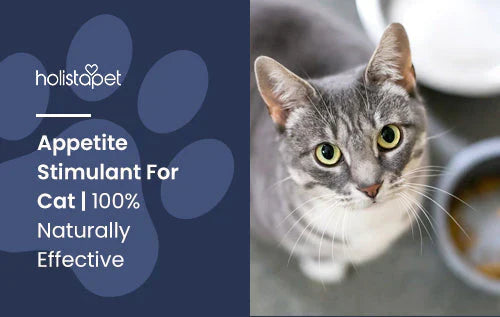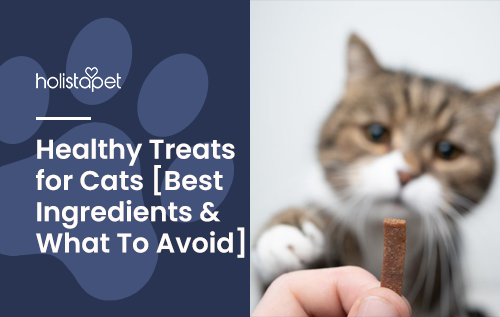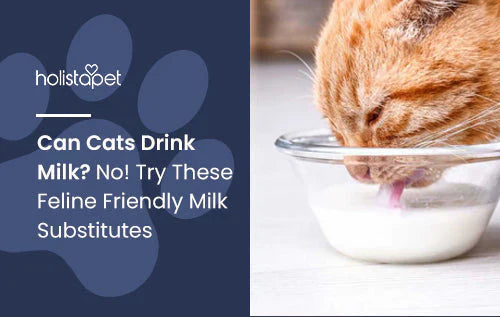Cats are picky eaters, but there comes a point where being picky poses a much more serious problem. A loss of appetite that persists for more than twelve hours is a sign that your cat could be ill or in pain. If the lack of appetite continues, you may need to seek out a vet for medical attention and possibly medication. However, there are a few things you can try as a natural cat appetite stimulant if you prefer a more natural approach and decide not to use drugs that could have adverse effects. Let's take a look!
Prescription Appetite Stimulants for Cats
Conventional medicine offers a few treatment options as an appetite stimulant for cats. Most people turn to these over the counter appetite stimulants as a first option because they are prescribed by the vet:
Mirtazapine
Mirtazapine is an antidepressant drug commonly used as a prescription appetite stimulant in cats. It works by blocking the receptors to which norepinephrine and serotonin normally bind. Possible side effects include:
- Twitching
- Hyperactivity
- Increased vocalization
Cyproheptadine
Cyproheptadine is a serotonin antagonist and an antihistamine that used to be popular for appetite stimulation. The more effective mirtazapine is often used in place of this drug because it does not need to be administered as frequently. Possible side effects can include:
- Hyperexcitability
- Dry mouth
- Increased heart rate
Corticosteroids
Drugs like prednisolone or prednisone can be effective in stimulating a cat's appetite. Long-term use can have serious side effects, such as:
- Aggression
- Thirst
- Cushing's disease (long-term use)
Natural Appetite Stimulants for Felines
You'd want the best cat appetite stimulants out there, and when it comes to sick cats, it's better to stick with the natural ones. Here are some favorable options to consider when you're working on stimulating appetite for your felines:
Catnip
Most cats absolutely love catnip. It comes from the mint family, so it is natural and therefore safe for your cat. A sprinkle of catnip on a toy or on the floor can significantly change your cat's behavior and stimulate the appetite.

New smells
Cats love salty and savory foods. You can try adding some bacon pieces or cheese bits to your cat's food. These desirable smells might increase your cat's interest in the food.
Increase blood flow
An increase in blood flow can help increase your cat's appetite. Playing with your cat is a great way to do this. You can also try giving them a massage to stimulate blood flow.
Relaxing environment
Loud people or other pets may cause stress to your cat and depress his hunger. Making your cat's environment comfortable for him can greatly change his mood and improve appetite.
Why Is My Cat Eating Very Little?
If your cat is eating very little, it's important to identify the underlying cause quickly. Several factors contribute to a cat's decreased appetite, including:
- Illness: A sudden loss of appetite is often one of the first signs of an underlying illness. Conditions like chronic kidney disease, liver disease, or gastrointestinal tract issues can cause significant decreases in a cat's appetite.
- Pain: Even minor pain, such as a toothache or an upset stomach, can cause a cat to avoid eating.
- Vaccinations: It's common for cats to experience a temporary loss of appetite after receiving vaccinations. Monitoring your cat's overall health during this period is crucial.
- Change in Routine: Cats are creatures of habit, and any disruption to their routine—such as travel, a new environment, or changes in household dynamics—can lead to stress and reduced appetite.
- Anxiety or Depression: Factors such as the loss of a companion pet, a new addition to the household, or even subtle changes in their environment can lead to emotional distress, resulting in decreased appetite.
- Medications: It's important to monitor your cat when starting any new medication, as this could be a potential cause of their lack of interest in food.
Related Post: Old Cat Not Eating [Reasons Why + Solutions]

CBD As A Feline Appetite Stimulant
CBD works as a natural appetite booster by supporting the endocannabinoid system (ECS) to help provide a strong internal balance within your cat. All cats and virtually other mammals have an ECS that's responsible for regulating many functions in the body, like sleep, mood, immune response, appetite, and digestion.
What Are the Benefits of CBD for Cats?
Because CBD interacts with the body's cannabinoid receptors, it can help support your cat's ECS, thus boosting your pal's overall wellness. Here are some of the many benefits to adding CBD to your feline friends' diets:
- Provide alleviation from discomfort or soreness, thus helping with mobility struggles.
- Act as an appetite booster, which can help with weight gain.
- Relax an upset stomach, which can help stimulate appetite.
- Assist with proper digestion so your cat's body has time to absorb all of the nutrients it needs to function well.
Loss of appetite can be due to one of many reasons, such as stress If your cat is nervous, it may not want to eat. CBD may help reduce nervousness and promote an overall calming effect. It may also help to calm the muscles of a tense cat. With less tension in the stomach, the cat can eat without feeling discomfort.
Does CBD Have Any Side Effects?
As an appetite boost, CBD is typically safe and non-toxic for cats, and no overdoses have been reported. Even if your cat takes a large dose of CBD, they'll be okay and probably feel a bit drowsier than usual. Nevertheless, some of the possible side effects of CBD include:
- Dry mouth
- Upset stomach or diarrhea
- Drowsiness or fatigue

How Much CBD Should I Give My Cat?
The regular strength dosage for pets is 0.25 milligrams of CBD per 1 pound of body weight. For a stronger dosage, the recommended amount is 0.50 milligrams of CBD per 1 pound of body weight. Remember, CBD overdose is unlikely, so don't be too worried about making adjustments to the dosage if you feel that it will meet your pet's needs. For more information regarding dosage recommendations check out our easy-to-use dosing chart!
CBD Product Suggestions for Your Cat
At HolistaPet, we make products that'll help boost your cat's appetite so that they can get back to being their happy, full-bellied selves again. Pick out your preferred natural way to increase cats appetite below:
CBD Cat Treats
Specially formulated with your cats in mind, these CBD cat treats come in delicious salmon and tuna juice flavor, which will leave your pal begging for more. They're broad-spectrum, contain no THC (so you don't have to worry about your kitty feeling high), and are non-GMO, gluten-free, and dairy-free.
CBD Capsules
These vegan capsules are mess-free and contain both CBD and hemp seed powder. Hemp seed powder is considered a superfood and contains added proteins, vitamins and minerals, unsaturated fats (like omega 3), and more that'll help increase your cat's wellness.
CBD Oil
If your feline friend has a specific diet that you prefer they stick to, you can try adding Holistapet's Cat CBD oil to their bowl at mealtime or to the cat treats you already have in your cupboard. You can also apply a dose directly into their mouth sublingually (this means underneath the tongue) by using the easy-to-use dropper tool that comes in every bottle of tincture.
If you've never given your cat medication by mouth before, it may be helpful to look up instructions online before trying to give them CBD sublingually. It is possible with mindful planning and patience, but be sure to take your time and give your cat lots of praise if you try out this method. Visit these No.1 Trusted Guides for your cat's nutrition to learn more.
Final Thoughts - Appetite Stimulant for Cat
Stimulating a cat's appetite, especially in times of illness or stress, requires a thoughtful approach that balances effectiveness with safety. Whether opting for natural appetite stimulants, prescription medications, or innovative uses of CBD, it's crucial to monitor your cat's response and consult with your veterinarian regularly. By exploring these options, you can help ensure your cat maintains a healthy appetite and overall well-being.



 CBD Oil for Cats - Fast Acting
CBD Oil for Cats - Fast Acting
 CBD Cat Treats - Easy Dose
CBD Cat Treats - Easy Dose
 CBD Calming Chews for Cats - Highly Rated
CBD Calming Chews for Cats - Highly Rated
 CBG Oil for Dogs and Cats - Loved by Thousands
CBG Oil for Dogs and Cats - Loved by Thousands





Leave a comment
All comments are moderated before being published.
This site is protected by hCaptcha and the hCaptcha Privacy Policy and Terms of Service apply.